|
|
|
Sort Order |
|
|
|
Items / Page
|
|
|
|
|
|
|
| Srl | Item |
| 1 |
ID:
162793
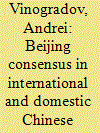

|
|
|
|
|
| Summary/Abstract |
This article examines the approaches of foreign researchers to the model of the Beijing Consensus formulated in 2004 by Joshua Cooper Ramo, including those of members of different Chinese schools of thought. We analyze the question is analyzed of whether China, in promoting the ideas of globalization, is ready to propose a realistic alternative to the Washington Consensus, or to reproduce the successful experience of its own development in other developing countries. The model of the Beijing Consensus is examined in the context of the change in global leadership.
|
|
|
|
|
|
|
|
|
|
|
|
|
|
|
|
| 2 |
ID:
135071


|
|
|
|
|
| Summary/Abstract |
Over the last 30 years, China has experienced tremendous growth, with many commentators attributing the rapid development to the ‘China Model’ (CM) or the ‘Beijing Consensus’ (BC). However, in recent years growth has slowed and an ever-increasing number of bears are predicting a financial crisis, economic collapse, and a very hard landing, perhaps even a lost decade a la Japan. All of this has led to heated debate about whether the CM is now exhausted, whether China is caught in ‘the middle-income trap’ (MIT) and whether a new model is needed for the next phase of development where China attempts the difficult transition from middle-income country to high-income country status. This article addresses the following five sets of issues. First, is there a CM or BC? If so, what does it entail, and does it differ from the model followed by other successful countries in East Asia? Second, is there a MIT? Is China stuck in the MIT or perhaps multiple MITs? Third, what adjustments to the economic model are required for China to continue its long march toward becoming a high-income country? Fourth, are political, legal and social reforms also required? If so, will all reforms proceed simultaneously or are reforms likely to be sequenced, with adjustments to the economy preceding reforms in other areas? Fifth, is there now a global convergence on a new model of development for developing countries – a Post-Washington, Post-Beijing Consensus?
|
|
|
|
|
|
|
|
|
|
|
|
|
|
|
|
| 3 |
ID:
119258
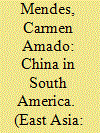

|
|
|
|
|
| Publication |
2013.
|
| Summary/Abstract |
The growing presence of the People's Republic of China (PRC) in South America highlights its domestic priorities. On the economic side, high levels of development, source of political stability and international recognition, exacerbate the need of importing natural resources and exporting manufactured products. Politically, the policy of national reunification, which is also an important provider of stability drawn from nationalism, demand strengthening relations with countries in areas attracted by Taiwan, isolating the island in the international arena. Beijing is actively working to increase its political leverage and shape the agenda of international politics giving South-South cooperation a strategic dimension well beyond mutual development. This fits South American objectives, namely the ones of Brazil, Argentina and Venezuela, that aim at diversifying international partnerships and perceive China as an alternative to the traditional orientation towards Latin America, the US and Europe. Positioning itself as a stakeholder, China creates the basis for an alternative international order using persuasion. The Chinese soft power in South America may be a drop of water in a much broader strategy.
|
|
|
|
|
|
|
|
|
|
|
|
|
|
|
|
| 4 |
ID:
186161


|
|
|
|
|
| Summary/Abstract |
This article deals with Egypt's debt crisis experience of the 1980s, which marked its own place in history. By the 1980s Egypt had a savings-investment gap; an export import gap; and a gap between government revenue and expenditure. The textbook answer was the Washington Consensus. Towards the end of the 1980s Egypt's military debt plus an interest rate of 15 per cent put the country in a situation where it wanted the debt to be cancelled. The USA responded that debt forgiveness wouldn’t be possible given the laws of the land. However, with Egypt’s participation in the liberation of Kuwait from the invasion of Iraq, the USA could cancel the debt. After that, Saudi Arabia and Kuwait cancelled Egypt's debts to them. Other countries in Europe agreed, provided that Egypt would reach agreement with the World Bank and International Monetary Fund. Consequently, Egypt’s interest rates turned from negative to positive. Inflation fell from 22 per cent to 4.1 per cent, and the budget deficit fell to 0.6 per cent. Active negotiations of the Egyptian Ambassador, Mr El Reedy, fully supported by President Mubarak were key to this solution. This reflects the importance of having a multidimensional discussion when discussing the economic aspect of debt.
|
|
|
|
|
|
|
|
|
|
|
|
|
|
|
|
| 5 |
ID:
140022
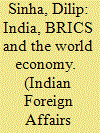

|
|
|
|
|
| Summary/Abstract |
BRICS is not an organised coalition seeking to create its own international order. It lacks adequate homogeneity and shared ideology for that. It is a pressure group of countries which want to be included in the decision-making forums of the international financial system. They feel that they have earned their place, and their credentials must be recognised. The slowdown in the growth rate in all BRICS countries, except India, has prompted many western experts to predict its demise. This appears to be an expression of desire rather than the result of objective analysis. The future shape of BRICS will depend on how the high priests of the present order react to their legitimate demands. What began as a prescient tip of a farsighted investment banker may either result in the reorganization of the existing system or lead to the setting up of a rival structure. The world would be better off in both eventualities
|
|
|
|
|
|
|
|
|
|
|
|
|
|
|
|
| 6 |
ID:
186158
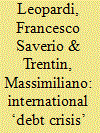

|
|
|
|
|
| Summary/Abstract |
The year 2022 marks the fortieth anniversary of the 1982 Mexican debt crisis, the first of a long series of financial turbulences that would soon spread to most of the developing world and beyond. Ever since, international historiography has produced a wide arrange of analyses that, despite their diversity, came to see the 1980s international debt crisis as a momentous event through which the United States and Western Europe reimposed their financial hegemony over the decolonised world and socialist camp. The contributions to this special issue of Middle Eastern Studies primarily aim at reassessing the process that brought economic neoliberalism throughout the Middle East and North Africa (MENA) in the context of debt crises. In particular, they challenge ‘teleological’ views that see the opening to market economy as a result of the creditors’ agenda, thus depriving actors in debtor countries of their agency. The essays published herein explore the levers, instruments and policy-making process to which debtor states resorted to shape their own integration process in the global neoliberal economy.
|
|
|
|
|
|
|
|
|
|
|
|
|
|
|
|
| 7 |
ID:
095538
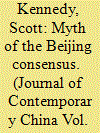

|
|
|
|
|
| Publication |
2010.
|
| Summary/Abstract |
The widely touted concept of the 'Beijing Consensus' (BC) suggests that China's economic success violates conventional theories of development and offers developing countries an alternative vision to the Washington Consensus (WC). Although ambitious, the original conception of the BC is not up to the task of being a worthwhile competitor to the alternative model from which its name was coined, not because of the WC's apparent worthiness, but rather because the BC is a misguided and inaccurate summary of China's actual reform experience. It not only gets the empirical facts wrong about China, it also disregards the similarities and differences China's experience shares with other countries, and it distorts China's place in international politics. In spite of these weaknesses, the BC is nevertheless a useful touchstone to consider the evolution of developmental paradigms, compare China's experience with that of others, identify the most distinctive features of China's experience, and evaluate its significance for the development prospects of other countries and for international relations.
|
|
|
|
|
|
|
|
|
|
|
|
|
|
|
|
| 8 |
ID:
144267


|
|
|
|
|
| Summary/Abstract |
This article analyses the agenda of the World Bank after the Washington Consensus, arguing that it became more encompassing, politicised and intrusive. This agenda expanded and recycled itself since, in addition to liberalisation, privatisation and macroeconomic adjustment, it also advocated the wide-ranging reconstruction of the economy, the relationship between society and nature, the state, civil society and visions of the world and social practices from a neoliberal perspective. It is argued that the fight against poverty was incorporated by the institution, which functioned as an auxiliary mechanism for this liberalisation. The importance of the incorporation of New Institutional Economics for this expansion and recycling is highlighted.
|
|
|
|
|
|
|
|
|
|
|
|
|
|
|
|
| 9 |
ID:
089135


|
|
|
|
|
| Publication |
2009.
|
| Summary/Abstract |
This article addresses the consequences of Washington Consensus and more recently post-Washington Consensus policy for democratic good governance in Africa. It acknowledges the increased focus in recent years of policy-makers on poverty as an important force in world politics. Despite this increased concern the authors argue that International Relations as a discipline fails to offer a suitable framework for understanding poverty as a social force. The article proposes a revival of Robert W. Cox and Jeffrey Harrod's approach based on 'patterns of social relations of production'. This offers a disaggregation of the condition that is often referred to in the literature as 'the poor' or 'the informal sector'. The article then outlines a comparative research agenda based on the cases of Tunisia and South Africa. It demonstrates how these cases provide the sternest test for assessing the authors' scepticism of the prospects of reconciling market-led development with good governance, whilst also offering a 'most-different' comparison given their very different political cultures. In conclusion, the article reflects on the methodological aspects to operationalising such a research agenda and proposes an ethnographic approach informed by the work of Burawoy.
|
|
|
|
|
|
|
|
|
|
|
|
|
|
|
|
| 10 |
ID:
186165
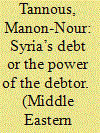

|
|
|
|
|
| Summary/Abstract |
If public debt appears as a means for global powers to put pressure on the Arab countries, the case of Syria in the 1980s seems to be different. Syria’s geopolitical positioning under Hafez al-Assad – asserting himself as a key partner – proved to be a lever during the negotiations on debt. This article shows that, despite asymmetrical relations, the debtor – Syria – resisted negotiating external debt under the terms set by the foreign creditors, i.e. international financial institutions (World Bank and IMF), Western countries and the Soviet ally. To illustrate this, we will take the example of the French-Syrian relation with regard to debt. As it was closely connected to foreign policy, debt was shifting from a technical problem to a political one, this gradual shift being favourable to the Syrian position. This study could thus help to identify each phase of this asymmetrical negotiation until an agreement was reached in 1996.
|
|
|
|
|
|
|
|
|
|
|
|
|
|
|
|
| 11 |
ID:
072483


|
|
|
|
|
| Publication |
2006.
|
| Summary/Abstract |
Over the economic crises of the 1990s, global economic understandings shifted from the early classical orthodoxy of the 'Washington Consensus' to a later Keynesian support for demand stimulus and capital controls. However, Russian policy - particularly after the 1998 ruble crisis - partly deviated from these broader trends, combining Keynesian capital controls with classical budgetary restraint. In offering a 'constructivist-institutionalist' explanation for this policy mix, we assume that agents can always interpret or construct events as varying types of crises, reshaping state society relations in the process. We then argue that classical interpretations of the early 1990s' crises legitimated orthodox policies and more importantly - alienated the Russian state from society. Given this backdrop, while later interpretations of the 1998 ruble crisis legitimated capital controls, the prior alienation of state from society precluded any domestic Keynesian coalition. Global pressures must, from this vantage point, be situated in specific social and institutional contexts.
|
|
|
|
|
|
|
|
|
|
|
|
|
|
|
|
| 12 |
ID:
138339
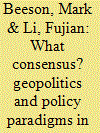

|
|
|
|
|
| Summary/Abstract |
The Washington Consensus is not what it was. A model of development associated with the Untied States, it has been diminished both by apparent failures, widespread criticism and by the recent economic crisis that had its origins in the US. Anglo-American capitalism has lost a good deal of its influence and attractiveness. As a consequence, alternative models of development have become more prominent, especially the so-called Beijing Consensus. The authors argue that at one level this evolving policy discourse and debate reflects a long-term structural change in the relative positions of China and the United States. However, it is far from clear that this transformation has gone far enough to underpin a significant ideational or policy challenge on China's part. On the contrary, the debate in China demonstrates that there is little appetite for, or expectation of, a major paradigm change in the near future.
|
|
|
|
|
|
|
|
|
|
|
|
|
|
|
|
|
|
|
|
|